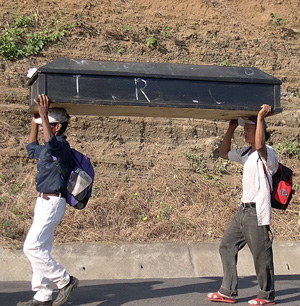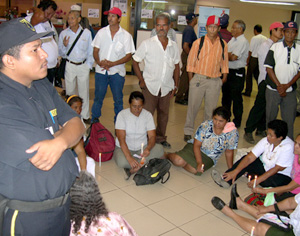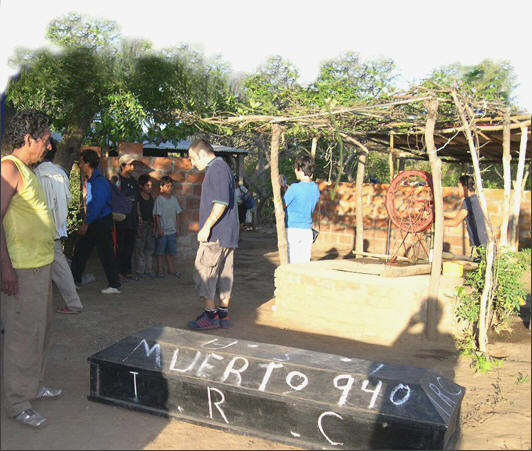|
With Julio
Sánchez, of the Humboldt Center
Growth does not always equal development
Nicaragua’s governmental bodies seem oblivious to the time
bomb the country is sitting on: the consequences of
zealously applying an agro-export model based on the
principles of the Green Revolution.
SIREL
discussed this threatening reality with Julio Sánchez,
head of the Biodiversity Department at the Humboldt Center.
The consequences of the agro-export model Nicaragua
implemented in the past century can no longer be concealed.
Deforestation, the advance of the agricultural frontier, an
alarming decline in water resources, the displacement of
whole communities, soil and water contamination, and the
proliferation of numerous diseases arising from the
indiscriminate use of synthetic agrotoxic substances...
these are all the result of a production system that has put
the survival of the entire country at risk. The large
national and international agricultural corporations,
however, continue to further that same production model
which has led the country to this situation.
-How is agrochemical commerce regulated in Nicaragua and
what agency is in charge of that regulation?
-Under the Pesticide Act (Law N° 274), the Ministry of
Agriculture (MAGFOR) was designated as the authority
in charge, but this Ministry works in coordination with the
Ministries of Health (MINSA) and Environment (MARENA)
in the approval, registration and revision of agrotoxic
substances.
The problem emerged with the application of Law N° 290, the
Executive Branch Organization, Competence and Procedures
Act. With this law, issues over competence and powers arose
among the various ministries, causing coordination to fail
in the monitoring and enforcement of the ban on the
agrotoxic substances listed under Ministerial Agreement N°
23-2001.
This lack of coordination has fostered the illegal
trafficking, mishandling and illegal storage of agrotoxic
substances, leading even to the installation of agrotoxic
substance outlets in non-authorized sites, such as markets
and urban areas.
This problem, which arises with Law N° 290, has not been
corrected and it has become historic and chronic. There has
been a great deal of confusion and lack of coordination.
-In addition to the banned agrotoxic substances there is
another list, which constitutes the
new dirty dozen. How is that list dealt with?
-As a member of the National Pesticide Commission, the
Humboldt Center proposed that all these agrochemicals
undergo revision. The outcome of this revision was that
these chemical substances had to be banned because at the
international level agrotoxic substances are considered “red
label,” that is, extremely dangerous, which means that they
must be pulled off the market. This report clashed with the
position of previous governments, and the MAGFOR was
too lenient with agrotoxic substance importers and
producers, purportedly in the interest of achieving national
growth. If we look at the figures, Nicaragua did
attain economic growth, but that growth has not translated
into development. There can be no development when thousands
of persons continue to fall ill, the health care system is
oversaturated, and the Ministry of Health spends 9 million
dollars a year to provide health care for these people.
|

The March of No
Return |
-In sum, there are
17 banned agrochemicals, which are nonetheless being
used in crops, and another 12 that should be banned, but
whose use is regulated.
-That’s correct. Of those 17, most are being used illegally.
This is the case, for example, of DDT. DDT has
been detected in waters and soil. This chemical has a very
low degradation rate, and the problem is that when it
decomposes, the metabolites can be even more toxic than
DDT itself.
Of the new dirty dozen, the only agrochemical that has been
banned is Monocrotophos, and this is only because it
was no longer being imported. As for the rest of the
products, the MAGFOR issued a decree that regulates
their use, but in a totally insignificant and useless way.
For these products we requested a progressive prohibition,
so as to eliminate the chemicals in stock. Nicaragua
faces huge problems in this sense. A company can bring a
pesticide into the country, distribute it and sell it, and
when it no longer has any use for it -because the product
expired or the company was unable to sell it- it stores it.
What’s absurd is that the disposal of these stored products
is no longer the company’s responsibility but the State’s,
and the cost of such disposal is covered by our taxes.
Companies should be responsible for the removal and disposal
of their products, but Nicaragua has no system in
place for agrochemical disposal.
-So what happens with these products?
-They’re simply left in storage, in unsuitable warehouses,
inside barrels that are not properly conditioned, and there
are often spills and the products seep into the water
system. It is highly likely that there are unknown sites
where barrels have been stored containing products that are
already banned and are still contaminating.
-In the case of the former sugar workers affected by Chronic
Renal Failure, the Ingenio San Antonio -owned by Nicaragua
Sugar Estates Limited- has continuously refused to
acknowledge a direct relationship between this illness and
their working conditions. Are there any studies and tests
that support a connection between the two?
-The company’s management and staff pretend they don’t know
what’s going on, because that would mean they’d have a moral
obligation to do something about it. For them it is better
not to see, to ignore the situation, and assume no
responsibility. Nicaragua has the best agrochemical
research and poisoning registry system. The Aquatic Resource
Research Center (CIRA) has conducted thorough
investigations on Nicaragua’s waters, and there are
sufficient medical and environmental research studies that
provide enough data to evidence the problem, and can help
reconstruct the logical chain of events. The proof is there
and it can be done!
The corporations are trying to avoid their responsibilities,
claiming that there is no scientific evidence, but we’re no
longer worried about a lack of evidence.
|

Sugar cane
laborers and widows at the
occupation of the
Social Security facilitie |
-Why?
-Because our legislation includes what is known as the
Precautionary Principle, which states that in the
absence of certainty, the protection of human health and the
environment must prevail. This is stipulated in Nicaragua’s
General Environmental Act and it is also ratified by
international agreements. Every international convention on
agrochemicals that has been approved internationally and
ratified by Nicaragua is based on this principle.
This means that we no longer need to have 100 percent
scientific proof to be able to assert that this is
happening.
-But the situation is very complex…
-That’s true, and companies very often claim that the
agrochemicals were already present in the water and that
it’s not their responsibility. How, then, can you prove that
the problem lies with the agrochemicals that they are using?
When their agrochemicals are mixed with those already
present in the waters, a new chemical is produced, which
also impacts human health. What we must not lose sight of is
that what an agrotoxic substances does is kill people. It’s
poison.
-Biofuels have began to be discussed in Nicaragua. What is
the position of the Humboldt Center in this matter?
-I don’t think we should rush into any position, and we’re
studying it. Biofuel planting leads to single-crop
agriculture, and we’ve already had some very negative
experiences with that kind of production. I think that
Nicaragua should choose crops that contribute to the
country’s progress. The population is suffering very
significant food shortages, and we can’t be thinking of
devoting areas that are ideal for food crops to produce
biofuel. Another problem is that these productions demand a
great quantity of agrochemicals, and this will generate even
greater problems. I don’t think this country should be
considering it. It should instead be thinking about
recovering indigenous varieties, promoting small farming,
towards increasing the income of rural families and
providing them with a more solid economic base. Nicaragua
needs to adopt a sustainable organic agriculture model,
because even the market is asking for it.

|
From
Managua,
Giorgio Trucchi
© Rel-UITA
April 16, 2007 |
 |
|
|
|